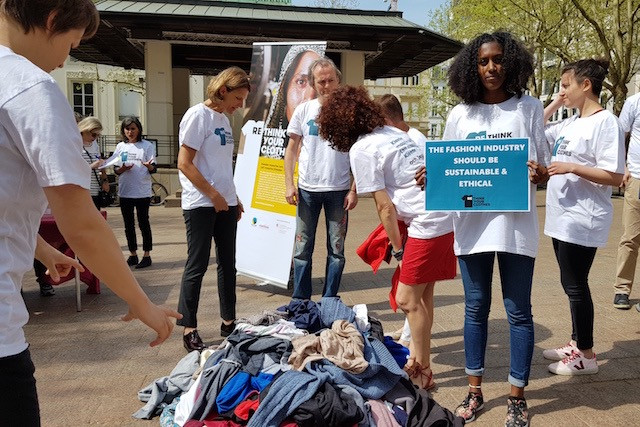“Clothes make people, people make clothes--yours too!”, “Fast fashion is not free, someone is paying for it”, “The fashion industry should be sustainable & ethical”: some poignant slogans, carried on the marchers’ posters, for a cause that affects millions of underprivileged people around the world.
“Rethink your clothes” was started by Caritas, an NGO, five years after the collapse of the Rana Plaza complex in Bangladesh, which killed 1,138 people and injured 2,500. The incident is still considered as the deadliest garment factory accident in history.
Poor working conditions, non-compliance with safety standards, child labour, forced labour, and moral and sexual harassment make day-to-day work unbearable for workers in many developing countries, according to the campaigners. Along with the social challenges, the environment is also impacted by the garment industry, suffering from high water and energy consumption, use of genetically modified crops and water pollution, the activists wrote in their flyers.
This week’s march was held to encourage people to support the rights of those workers, help protect the environment, and contribute to a more just and equitable world. For approximately half an hour, 30 performers and Caritas volunteers removed layers of clothes, threw them on the ground and then created a mound at the centre of place d’Armes.
One participant was the artist Jennifer Lopes, who prefers to wear secondhand clothing and uses her seamstress skills to revive old clothes. “I work a lot with recovered materials and I felt that it was important to participate, to contribute in my own way to this event that touches me a lot and that should touch more people,” she said on Tuesday.
The performance was followed by speechs by Romain Schneider, the LSAP international cooperation minister, Ana Luisa Teixeira of Caritas, and Jean-Louis Zeien, president of the NGO Fairtrade Lëtzebuerg.
Consumption habits
Teixeira said at the rally:
“You should not hesitate to question your favourite stores about the origin and the conditions of manufacture. Shopping has become a way of life, a weekly hobby that is commonplace and today an integral part of our culture.”
She continued:
“One can already start by asking oneself about the usefulness and necessity of these purchases; it is already a good start. Subsequently, you can choose clothes from a label that respects human rights. It’s up to each of us to say ‘stop’ to a waste economy.”
One of the campaign organisers, Nadia Bemtgen, stated that the initiative not only promotes a boycott of big brands, but to push people to reconsider their consumption. “We are encouraging people to think more when they buy, to buy less, to buy better, when to buy, to rethink the needs of consuming, as well as the environmental cost. She also added that, “We came to shock people, show our frustration to overconsumption, human rights.”
The “Rethink your clothes” campaign follows the popular “Who made my clothes” hashtag on Instagram, which started a few months ago and reflects a growing interest in social and ecological issues.
Correction: A previous version of this article incorrectly implied the use of the “Who made my clothes” hashtag on Instagram had ended; it is still an active campaign. This was updated on 25 April at 2pm.
